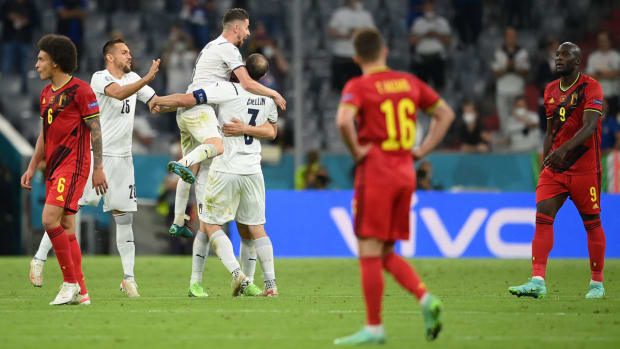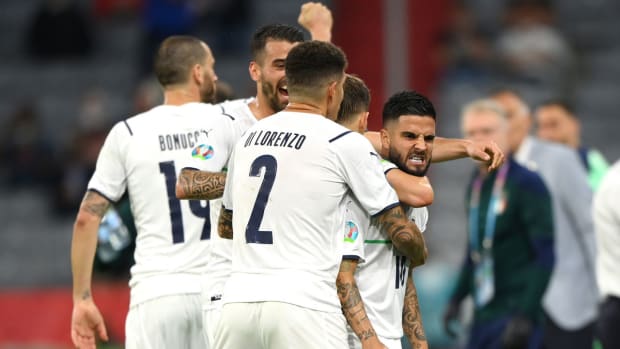The bell may have tolled for Belgium's golden generation, while Italy's combo of youth and experience, attacking and defending, could see the Azzurri wind up coronated.
MUNICH — Jérémy Doku whirred down the left and fed Kevin De Bruyne just inside the box. He drove a cross along the top of the six-yard box, just out of reach of the retreating Leonardo Bonucci and Giorgio Chiellini. At the back post, Romelu Lukaku came in on it. But he was stretching and his contact was not entirely clean. The ball spun up and hit Leonardo Spinazzola on the thigh. Anywhere else—higher, lower, left, right, faster, slower, and it would have gone in. But it didn’t. It hit the left back and then rebounded just out of reach of Lukaku’s second desperate swipe.
There was still half an hour to play, but that was the incident that settled the game. After that, for all Belgium kept pressing, it was just a matter of details. Italy knew then that it would progress to the semifinal of Euro 2020 to face Spain—although it will have to do so without the dynamic Spinazzola, who damaged his Achilles tendon when he slipped in chasing Thorgan Hazard—and Belgium knew that it was on the way out. And, more than that, that this was probably the end for its golden generation.

Three key players—Vincent Kompany, Marouane Fellaini and Radja Nainggolan—had already retired after the 2018 World Cup. At this tournament, nine outfielders in the squad were 30 or over. At the back, especially, there will have to be changes. Just because Italy can play a pair of center backs with a total age of 70 doesn’t make it a good idea to field a back three with a total age of 101, as Belgium has at the Euros.
There is, inevitably, a sense of frustration that a group of players this gifted never quite managed to bring Belgium the first trophy in its history. To call that a failure, given the infrequent and unpredictable nature of international tournaments, is unfair, but whatever sense of unfulfillment there may be, it lies less in the last two tournaments under Roberto Martinez than in the earlier days under Marc Wilmots when Belgium never came close to fulfilling its potential. At the World Cup and at these Euros, Belgium went out playing well—it lost to the eventual champion in Russia, and may also have done so Friday.
The lack of mobility of the back three was probably what forced Belgium, as it had against Portugal, to play a little deeper, looking to strike on the break. But for Gianluigi Donnarumma, who made two fine saves in the first half, one of them from a De Bruyne shot truly exceptional, the plan may have worked. Playing on the counter is a style that suits De Bruyne and Lukaku. But the defense, fundamentally, dogged as it was against Portugal, is no longer good enough.
A mistake from Thomas Vermaelen allowed Marco Verratti to tee up Nicolò Barella for the opener, and Lorenzo Insigne then hammered in a brilliant second—although it was aided by a slowly retreating defense that gave him time to measure his shot into the top corner. Belgium could easily have been finished, but a generous penalty on the stroke of halftime, converted by Lukaku after Giovanni Di Lorenzo had been penalized for a shove on Doku, gave the Red Devils a lifeline.

Belgium had chances in the second half, made a gallant effort to keep the golden dream going for one more game, but this Italy is capable not only of attacking but defending. The traditional virtues have not been eradicated in the Mancini revolution: they can still waste time and feign injury with the best of them.
But more significant was the way Italy’s system stood up structurally. One doubt about it had been the fact that in its unbeaten run, which now stretches to 32 games, it had not beaten a side ranking in the top 15 in the world by the FIFA rankings. It has now: it has beaten the team ranked No. 1. First it did so by attacking, and then by defending.
Spain at Wembley in the semifinals will be another test and another level. It will be the first time in this tournament that Italy has faced a side that has really wanted to keep the ball, let alone one that is capable of doing it. But Italy has so far answered every question that has been asked of it in this competition. It has by some way been the most impressive side at the tournament. All it has to do now is win it.
More Euro 2020 Coverage:
- Wilson: Spain, Switzerland and Penalty Kick Role Reversal
- Gastelum: Ranking the Euros' Quarterfinalists
- Wilson: Where it Went All Wrong for France
- Wilson: England's Approach vs. Germany Winds Up Being Perfect
The bell may have tolled for Belgium's golden generation, while Italy's combo of youth and experience, attacking and defending, could see the Azzurri wind up coronated.
MUNICH — Jérémy Doku whirred down the left and fed Kevin De Bruyne just inside the box. He drove a cross along the top of the six-yard box, just out of reach of the retreating Leonardo Bonucci and Giorgio Chiellini. At the back post, Romelu Lukaku came in on it. But he was stretching and his contact was not entirely clean. The ball spun up and hit Leonardo Spinazzola on the thigh. Anywhere else—higher, lower, left, right, faster, slower, and it would have gone in. But it didn’t. It hit the left back and then rebounded just out of reach of Lukaku’s second desperate swipe.
There was still half an hour to play, but that was the incident that settled the game. After that, for all Belgium kept pressing, it was just a matter of details. Italy knew then that it would progress to the semifinal of Euro 2020 to face Spain—although it will have to do so without the dynamic Spinazzola, who damaged his Achilles tendon when he slipped in chasing Thorgan Hazard—and Belgium knew that it was on the way out. And, more than that, that this was probably the end for its golden generation.

Three key players—Vincent Kompany, Marouane Fellaini and Radja Nainggolan—had already retired after the 2018 World Cup. At this tournament, nine outfielders in the squad were 30 or over. At the back, especially, there will have to be changes. Just because Italy can play a pair of center backs with a total age of 70 doesn’t make it a good idea to field a back three with a total age of 101, as Belgium has at the Euros.
There is, inevitably, a sense of frustration that a group of players this gifted never quite managed to bring Belgium the first trophy in its history. To call that a failure, given the infrequent and unpredictable nature of international tournaments, is unfair, but whatever sense of unfulfillment there may be, it lies less in the last two tournaments under Roberto Martinez than in the earlier days under Marc Wilmots when Belgium never came close to fulfilling its potential. At the World Cup and at these Euros, Belgium went out playing well—it lost to the eventual champion in Russia, and may also have done so Friday.
The lack of mobility of the back three was probably what forced Belgium, as it had against Portugal, to play a little deeper, looking to strike on the break. But for Gianluigi Donnarumma, who made two fine saves in the first half, one of them from a De Bruyne shot truly exceptional, the plan may have worked. Playing on the counter is a style that suits De Bruyne and Lukaku. But the defense, fundamentally, dogged as it was against Portugal, is no longer good enough.
A mistake from Thomas Vermaelen allowed Marco Verratti to tee up Nicolò Barella for the opener, and Lorenzo Insigne then hammered in a brilliant second—although it was aided by a slowly retreating defense that gave him time to measure his shot into the top corner. Belgium could easily have been finished, but a generous penalty on the stroke of halftime, converted by Lukaku after Giovanni Di Lorenzo had been penalized for a shove on Doku, gave the Red Devils a lifeline.

Belgium had chances in the second half, made a gallant effort to keep the golden dream going for one more game, but this Italy is capable not only of attacking but defending. The traditional virtues have not been eradicated in the Mancini revolution: they can still waste time and feign injury with the best of them.
But more significant was the way Italy’s system stood up structurally. One doubt about it had been the fact that in its unbeaten run, which now stretches to 32 games, it had not beaten a side ranking in the top 15 in the world by the FIFA rankings. It has now: it has beaten the team ranked No. 1. First it did so by attacking, and then by defending.
Spain at Wembley in the semifinals will be another test and another level. It will be the first time in this tournament that Italy has faced a side that has really wanted to keep the ball, let alone one that is capable of doing it. But Italy has so far answered every question that has been asked of it in this competition. It has by some way been the most impressive side at the tournament. All it has to do now is win it.
More Euro 2020 Coverage:


0 Comments